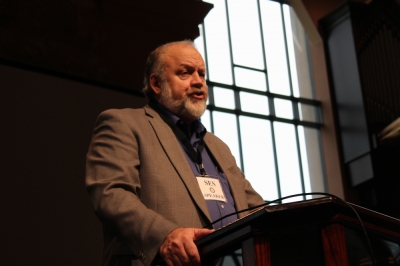Gary Habermas expresses caution about believing near-death experience stories

Notable Christian apologist and philosophy professor Gary Habermas recently expressed caution when it comes to believing those who said they had a near-death experience.
Habermas was one of a panel of experts recently interviewed on an episode of Dallas Theological Seminary’s “The Table” podcast. During his remarks, Habermas warned that many claims about having visited the afterlife lack evidence and cannot be objectively verified.
“A lot of times people don’t want to believe in these Christians because they think they’re going to get in there, that a Hindu says he’s going to Heaven because an angel or something told him that,” he said.
“That is no different than you living next door to a Hindu fellow and him telling you he thinks he’s going to go to a good place when he dies. That’s his testimony … But I don’t know that he was in Heaven, and I have no evidence to believe that an angel told him anything.”
Habermas also spoke critically of the minority of reported cases in which a person claims to have visited Hell instead of Heaven, echoing his critique of lacking evidence.
“You go into Hell cases, Hell cases too. I don’t have any evidence that those people were sent there, so I cannot vouch for where they are,” continued Habermas.

He did note that there were many examples of “evidential near-death experiences,” in which a person reported experiences while their heart and brain are not functioning.
“When the guy says I went away to Heaven, blah, blah, blah, I don’t think you can put much stock in that at all because you’re not going get evidence,” he said.
“The evidential ones though say you’re conscious. That’s what they show. And you go, ‘Well, yeah. But that could be for minutes.’ But some of them go for hours.”
Mikel Del Rosario, adjunct professor at William Jessup University, spoke about being critical of times when people claim to have died and seen relatives or similar near-death experience stories.
“We can’t really verify that. And so it’s hard to really give credence to that kind of story. Certainly they had some kind of an experience, but what that means, I don’t know,” said Del Rosario.
“But there are evidential cases … that help us see, you know what? There might be something to this because if people can have reports about things that aren’t just in their head or just in their private mental state, we can actually check up on those.”
Del Rosario explained that there were “fascinating” accounts, such as near-death experiences coming from “blind people who report things that they can see.”
“When they were in their body, they couldn’t see it because they’re blind. And during the operation they’re reporting the kinds of tools that are being used and procedures, and it's just amazing stuff,” added Del Rosario.
Regarding the issue of non-Christians claiming to have visited Heaven, Del Rosario replied that “what they’re telling you says a lot more about them and their interpretation than the experience they’re having, especially if there’s no evidential handles for it.”
“I could have a really vivid dream where I was flying over campus and I felt like I was flying. It was a real experience. But the reality is, objectively I was just lying in my bed all night,” he explained.
“So somebody, whether they’re conditioned by their culture to see Jesus or identify the light as God or if they’re seeing Hindu figures because of their culture, we can’t really adjudicate what’s going on there because again, it’s just private, mental states.”
In addition to Habermas and Del Rosario, the podcast episode also featured Daniel Hill, an assistant professor of theological studies at DTS, and was moderated by Kymberli Cook, senior administrator at the Hendricks Center.
Near-death experiences are a popular subject in both Christian and evangelical circles, with several faith-based books and movies being released on the subject.
One popular book released in 2010 was Heaven Is for Real: A Little Boy's Astounding Story of His Trip to Heaven and Back, which was later made into a movie.
At the center of the book was the claim that when he was 4 years old, Colton Burpo, the son of a pastor, met Jesus and many deceased relatives after undergoing emergency surgery in 2003.
“People may have their doubts about my story, but the thing is, I wasn't coaxed into doing this,” explained a teenaged Burpo in 2015.
“I wanted to tell people about my experience. In fact, I started sharing my story with my friends and people in our town way before there was a book called Heaven is for Real.”
Many have been skeptical about such accounts, with some pointing to people who initially claimed to have had a near-death experience only to retract their original story.
One example was Alex Malarkey, the subject of the book The Boy Who Came Back from Heaven, who in 2015 admitted that he had lied about going to Heaven in 2004 after a car crash.
"I did not die. I did not go to heaven," wrote Malarkey in a letter to assorted Christian book sellers. “I said I went to heaven because I thought it would get me attention.”
“When I made the claims that I did, I had never read the Bible. People have profited from lies, and continue to. They should read the Bible, which is enough. The Bible is the only source of truth. Anything written by man cannot be infallible.”





















